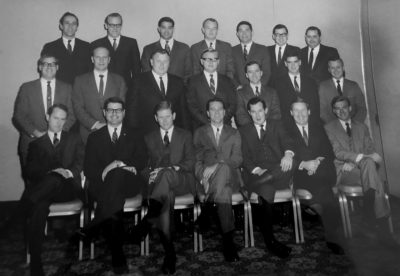
“If my future were determined just by my performance on a standardized test, I wouldn’t be here. I guarantee you that.” – Michelle Obama
Checking off the steps in a manual is following, not leading. Often, it’s attitude, more than aptitude, that determines altitude. I have learned that only when we are put in a position to fail, can we truly succeed.
I didn’t learn those buzz phrases from any sales seminar, but from my years working in sales and sales management.
I grew up in the heartland of our great country. “Flyover Land” some call it, as though it’s only something to skip over on the trip from coast to coast. But I think people should get to know this part of America better, to meet the midwest folks who I find so grounded, logical, and hard working.
I went to school in Fulton, Missouri, a town with only one movie theatre. My first sales job was in southern Ohio and my first sales management position was with Procter and Gamble in Indiana.

The team I assembled in The Hoosier State was full of these great midwesterners and our performance caught the eye of upper management at P&G.
I was asked to hire an extra sales rep to further add to our success.
Even though I was confident in my ability to spot talent, I still adhered to P&G hiring guidelines: many interviews and loads of tests. Not the drug tests, which are common today, but intelligence tests.
At P&G, we wanted to find either development candidates who could move up the ladder quickly or stable representatives who would stick around for the long haul. What we didn’t want were the near-miss folks who wouldn’t fit either group, leaving within a few years, costing the company both time and money.
With the rural makeup of my new territory and the balance within the current unit, I began looking for a stable candidate.
Don was my choice. He was a little older and had no formal sales experience or higher education, but he fit the rural landscape perfectly.
Like every other candidate, Don had to take our company test. They were administered by the personnel department and scores were always confidential. Even my boss didn’t know the exact results.
Those final scores must have been poor because when my boss eventually called about Don, the conversation centered on how important it was for this new territory to be successful and how it was my responsibility to be 100% sure we had the right man for the job. It was a long conversation, but Bob finally agreed to let me give my choice a try.
Don’s start was slow – almost painful. Although he understood the products with their many features and benefits, he struggled with “asking for the order.” That’s the part where the customer gets to decide. Don, like so many, didn’t want to feel rejected, so closing the sale was hard.
My boss was impatient with our progress. His calls grew more frequent, but I wasn’t giving up on Don.
The magic was there, I just needed to find the right switch to turn it on.
One day, after visiting the many storage rooms and warehouses of our customers, Don and I stopped for a Coke. I asked him what he saw in all the places we had been. “Junk mostly, stuff that’s been around for years, just collecting dust!” was his reply.
He went on to blame the pushy sales people from other companies for convincing merchants to buy all that extra inventory. He was sure those were exactly the people he didn’t want to be.
I changed the subject to Procter and Gamble brands, highlighting how well everything sold and how profitable P&G brands were for our merchants who displayed them.
A light bulb came on for Don that day. “So if my customers spent more money with me, and less with those junk peddlers, I would be doing them a favor! They’d have higher sales, more profits, plus uncluttered storage rooms!”
“Don, that’s a great idea,” I smiled, “Give it a try!”
Soon the tone in the calls from my boss improved. Bob now wanted to know what had happened and why the sales numbers had taken off so quickly? What had I done?
Nothing had changed, I told Bob. Don’s attitude was still the same, he’d just found a new way to serve his customers.
He continued to hit the most ambitious goals set for his new territory and I now scheduled new employees to spend time with Don and hear his message. “Take care of your customers, and they’ll take care of you.”
Years later, I pressed Bob for the information he had never shared. Slowly it came out. The tests had been bad and Don should never have been hired.
Just as I believed in Don, my boss believed in me. He understood that there would be no learning for me if he stepped in to make the final choice. Bob was a leader.
Clearly, Bob is a hero in this story for giving me the space to make a mistake. By standing back and being a good leader, like a good parent, he was willing to let failure be part of my journey.
Don is the other hero. His never-give-up attitude and enthusiasm showed how important those unmeasurable qualities are in life.
Who are the people you know like Don, people who may not test well, but have attitudes that make up for any short fall in aptitude.
How about the leaders you know like Bob who are willing to let go, to allow true development be the self-development of the student?
Do you have examples of times when it’s the awareness in a give and take conversation that leads to a successful outcome, rather than just one’s dominance of the discussion?
As always, the conversation starts here.
“In the ordinary choices of every day we begin to change the direction of our lives.” – Eknath Easwaran
Epilogue
It was Don’s attitude that made him stand out in the early interviews. Other candidates had more aptitude, both in education and work experience, but I was convinced that the customers in this midwest market would respond to Don and his sincere caring.
